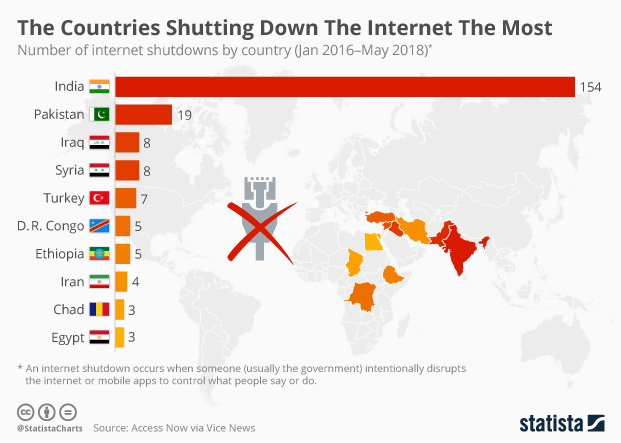Chad: The country where the internet has been shutdown for one year – Tek Portal

Salim Azim Assani, who lives in Chad, is finding out the hard way after living under internet censorship for more than 365 days and counting. Assani, 33, runs WenakLabs, a digital co-working space in the Chadian capital of N’Djamena and has resorted to using expensive Virtual Private Networks (VPNs) to circumvent the shutdown.“It’s absolutely necessary to use VPN and very often we find ourselves abroad using it and only realize that we don’t need it elsewhere,” Assani said.A VPN acts as a secure tunnel between devices and the internet that protects users from snooping and censorship and allows them to mask their location on the internet.
The social media blackout began in March 2018 after recommended reforms to the constitution that would allow President Idriss Deby to stay in power until 2033, when he will be 81.
Deby has been in power since 1990 and had previously pledged to restore term limits before the country’s 2016 elections.
The country’s internet services was shutdown almost immediately after the planned reforms were announced.
Julie Owono, the Executive Director at Internet Without Borders (IWB), a Paris-based non-profit organization advocating for freedom of expression on the internet told CNN: “Last year on March 28, we received various reports from our resources on the ground that access to WhatsApp was very difficult or just impossible in some places.”
Owono believes the shutdown was introduced because videos of violent clashes among the Zaghawa tribe in northern Chad were being shared on WhatsApp, and the government took advantage of that to repress discontent among citizens.
Communal clashes are rife in Chad, a landlocked country in central Africa that is roughly the size of Texas. It has had a turbulent history of religious and ethnic conflict and intermittent civil war since it gained independence in 1960 from France.
Since March 2018, people in Chad have been unable to access sites such as WhatsApp, Viber, Facebook, and Twitter. It’s not the first time in Chad either: a shutdown of the internet lasted for eight months in 2016 following a disputed presidential vote that secured a fifth term in office for Deby.
Internet shutdowns are frequently used by governments across Africa.
In 2019 alone, Sudan, Zimbabwe, and the Democratic Republic of Congo have all enforced a shutdown for various reasons.
The economics of censorship
Protests in the internet age often begin or become amplified on social media. Autocratic regimes in Africa shut down the internet to repress free speech and freedom of association during uprisings that challenge their leadership.
It’s difficult to say if these measures are effective but they adversely affect the economy of these countries.
Internet shutdowns in 10 sub-Saharan African countries led to a deficit of more than $235 million from 2015 to 2017, according to a Collaboration of International ICT Policy in East and Southern Africa (CIPESA) report.
IWB estimates the shutdown has cost the Chadian economy at least $20 million since it began last March, and Assani, of WenakLabs, has been feeling the real-life impact.
“This situation slows down our work in terms of skills development and digital communication. It is clear that this is a strain on our economic growth,” he said.
The 2014 fall in oil prices and the weak security situation has left Chad’s economy in a deep recession and poverty continues to rise with almost six million of its 15 million citizens living in extreme poverty.
“The Chadian government needs to take advantage of the opportunities the internet offers for economic development and especially for young people,” says Muhammad Sani Abdullahi, a former World Bank policy expert and current member of its Advisory Council on Citizen Engagement.
“For young people who constitute a greater chunk of the populace, reliance on the internet for daily functions has become a must, business, both small and large wouldn’t be able to continue their everyday activities should the government keep the people cut out,” Abdullahi said.
A lack of attention
If you’re wondering why you’re only just hearing about a country limiting internet access for more than a year, it is because Chad doesn’t receive much attention in the international news media.
Beyond the trial and conviction of its former dictator Hissene Habre for crimes against humanity, Chad hardly ever finds itself in the spotlight.
Yet the lack of attention doesn’t diminish its importance on the international stage.
Indeed Chad is an important ally of Western nations in the fight against terrorism, says John Campbell, a fellow at the Council for Foreign Relations and former US ambassador to Nigeria.
“Chad is important because of its physical location. It is part of the Lake Chad basin. It also borders on Sudan and Libya. It’s literally right in the heart of a part of Africa where the security challenges are severe,” Campbell said.
“The second point is that Chad for a long time has had an important security relationship with…






